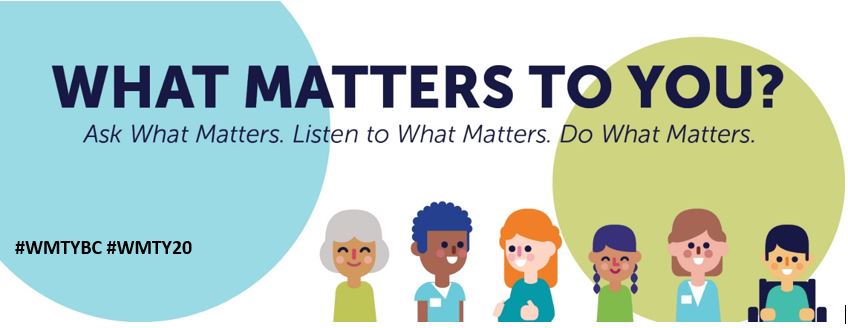Posted • Last updated
Categories: Patient Voice Mail, What Matters to You
In the spirit of encouraging you to think about “What Matters to You?” every day, we thought that an article about ‘always events’ was just the ticket! David McNally leads the spread of Always Events as NHS (National Health Service) England’s Head of Experience of Care. In 2018, he talked about the importance of Always Events like “What Matters to You?”

How do you describe Always Events to people unfamiliar with the concept?
We start by explaining that this is a way of working that begins by asking what really matters to the people who use their services. The first step is as simple as that.
Frontline care staff work with patients to understand what matters most to them and to agree what (care or actions) should be delivered on a consistent basis. They ask, “What is it that you really care about that we’re not doing for you in a consistent way?” and then they work out a way of doing it.
What inspired your team to focus on Always Events?
Our interest originated in work done in England by Dr. Kate Granger. She had cancer and sadly died two years ago. She started a campaign called #HelloMyNameIs because, while she was getting cancer treatment, she kept encountering health care staff she’d never met before who didn’t introduce themselves, and it bothered her. She wanted to know people’s names and she wanted them to properly explain who they were. It mattered to her that this should happen every time.
We realized that there were probably many more things that patients would like to see happen every time they encounter the health care system. When we came across Always Events, it was absolutely what we were looking for. We liked that Always Events is an improvement methodology that involves co-production between patients and frontline care staff.
How do you explain “co-production” to care providers and patients and families?
We explain that it is about working in genuine partnership with patients, identifying together what needs to be improved and jointly working on that. It’s shifting us away from the idea that we as professionals necessarily have all the right answers, whether we’re doctors, managers, nurses, physios, or whatever we might be.
Some health care professionals worry that co-designing care might increase costs or lead to unrealistic expectations. What do you say to those concerns?
There’s an interesting parallel with some of the workaround shared decision-making where some doctors make assumptions about the kinds of choices patients would make in terms of treatment. They assume patients will choose the most expensive.
It’s the same with Always Events. It fascinates me how often patients come up with ideas and the staff go, “We wouldn’t have thought of that.” Their fresh perspective brings in a set of different improvement ideas. They almost never cost a lot of money. They’re typically very simple things to do.
What are some examples of simple, low-cost change ideas?
One of our early Always Events pilots was a service for people with learning disabilities who were transitioning from hospital care to living in the community. The service users described feeling as if they go from having support 24 hours a day to not being quite sure how to connect with help.
The service users are assigned a new (support) worker when they leave the hospital, and the first contact they get is a letter introducing the new worker saying, “We’re coming to see you” with a date and time when they’re going to arrive.
The service users said, “We don’t know who this person is. They’re just a name on a piece of paper.” They said, “How about if you put a photograph on the letter? Then, when we open the door, we’ll know who they are. It’ll be easier to get to know them.” Adding a photo costs nothing.
Another service user suggested putting their worker’s contact information on a fridge magnet. “We don’t have to go and look for the letter if we know right where to look for their number.” Again, it’s a ridiculously cheap suggestion that addressed what mattered to that group of patients. More importantly, these changes led to a reduction in people coming back (to the hospital) in a disorganized way because they felt better supported out in the community.
It seems simple when you explain it but aren’t you talking about challenging the status quo?
It does challenge the culture of how we’re used to doing things. Organizations that embraced Always Events quite some time ago have said it changes the culture (of health care) because it begins to say, “Yes, we can and should work with patients as genuine partners.”
I suspect it’s similar elsewhere, but in England, we have a history of what we’ve called patient involvement, but it’s often been the wrong way around. We’ve often determined what we think the answer to a problem might be. Then maybe we’d get a group of patients together to say, “Do you think this is the right answer?” instead of getting them in the room and working out what the questions are together.
We promote an approach that says, “This is an area where you know you need to make some improvements. Don’t do anything else until you’ve got the patients in the room with you so that you’re having the whole conversation right from the very beginning.” It can feel a bit unfamiliar at first because it challenges what we’ve done before, but it can be immediately appealing to many people. It also challenges the leadership culture in similar ways.
How is it challenging to leadership culture?
It requires a facilitative approach to leadership and an openness to working with patients at a strategic and senior level. One of the concepts that are been developing over the last four to five years is the concept of patient leadership. It’s the idea of having patients who have the skills and the capability to operate at the same level as leaders in the system who can bring a different perspective and work as genuine partners areas.
How are Always Events implemented in England?
We began this work with IHI and Picker Europe — who help us with measurement and evaluation — for the best part of three years ago now. We started very small to test in the way that we would with any improvement. We began in two services within two organizations.
We wanted to show that Always Events could work within how the health service is structured in England because sometimes you must show a proof of concept to people to be effective. Now we have over 100 organizations (implementing Always Events). That’s about 40 percent of our health care providers, and still growing.
We always saw the potential for it to take on the feel of a social movement. I think that’s where we’re getting to because so many of the people who hear about it like the concept. They see the possibilities the minute you describe it to them. People can immediately imagine how it would work in their own organization and it spreads.
Editor’s note: This interview has been edited for length and clarity.
Source: Institute for Healthcare Improvement
Link: http://www.ihi.org/communities/blogs/why-asking-what-matters-to-you-should-be-an-always-event
Author: David McNally


